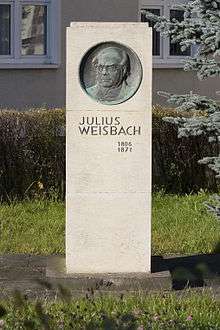Julius Weisbach
Julius Ludwig Weisbach (born 10 August 1806 in Mittelschmiedeberg (now Mildenau Municipality), Erzgebirge, died 24 February 1871, Freiberg) was a German mathematician and engineer.

Life and work
Weisbach studied at the Bergakademie in Freiberg from 1822 - 1826. After that, he studied with Carl Friedrich Gauss in Göttingen and with Friedrich Mohs in Vienna.[1]
In 1831 he returned to Freiberg where he worked as mathematics teacher at the local Gymnasium. In 1833 he became teacher for Mathematics and the Theory of Mountain Machines at the Freiberg Bergakademie. In 1836 he was promoted to Professor for applied mathematics, mechanics, theory of mountain machines and so-called Markscheidekunst.[2]
Weisbach wrote an influential book for mechanical engineering students, called Lehrbuch der Ingenieur- und Maschinenmechanik, which has been expanded and reprinted on numerous occasions between 1845 and 1863.[3]
He also refined the Darcy equation into the still widely used Darcy–Weisbach equation.
In 1868 he was elected a foreign member of the Royal Swedish Academy of Sciences.
Selected publications
- Handbuch der Bergmaschinenmechanik (2 Bde., 1835/1836)
- Lehrbuch der Ingenieur- und Maschinenmechanik (3 Bde., 1845/1863)
- Der Ingenieur, Sammlung von Tafeln, Formeln und Regeln der Arithmetik, Geometrie und Mechanik (1848)
- Die neue Markscheidekunst und ihre Anwendung auf die Anlage des Rothschönberger Stollns bei Freiberg (1851)
- Anleitung zum axonometrischen Zeichnen (1857)
Notes
- Wegert, Hebisch & Lyska, page 3.
- Kurrer, page 868.
- Mikhailov, page 1012.
References
- Kurrer, Karl Eugen (2006). "Der Enzyklopädist der Technischen Mechanik des 19. Jahrhunderts – Zum 200. Geburtstag von Julius Weisbach (1806–1871)". Bautechnik (in German). 83 (12): 868–875. doi:10.1002/bate.200610076. ISSN 1437-0999.
- Mikhailov, G.K. (1994). "Hydrodinamics and Hydraulics". In Ivo Grattan-Guinness (ed.). Companion Encyclopedia of the History and Philosophy of the Mathematical Sciences. Routledge. pp. 1006–1022. ISBN 978-0-415-09239-5.
- Wegert, Elias; Hebisch, Udo; Lyska, Werner. "Julius Weisbach als Wegbereiter der angewandten Mathematik" (PDF). Fakultät Fur Mathematik und Informatik (in German).
External links
| Wikimedia Commons has media related to Julius Weisbach. |
- O'Connor, John J.; Robertson, Edmund F., "Julius Weisbach", MacTutor History of Mathematics archive, University of St Andrews.
- Rouse, Hunter (2008). "Weisbach, Julius Ludwig". Complete Dictionary of Scientific Biography. Retrieved 22 October 2016.